Rafi Sahab- The Master of the Complete Range
By Achal Rangaswamy
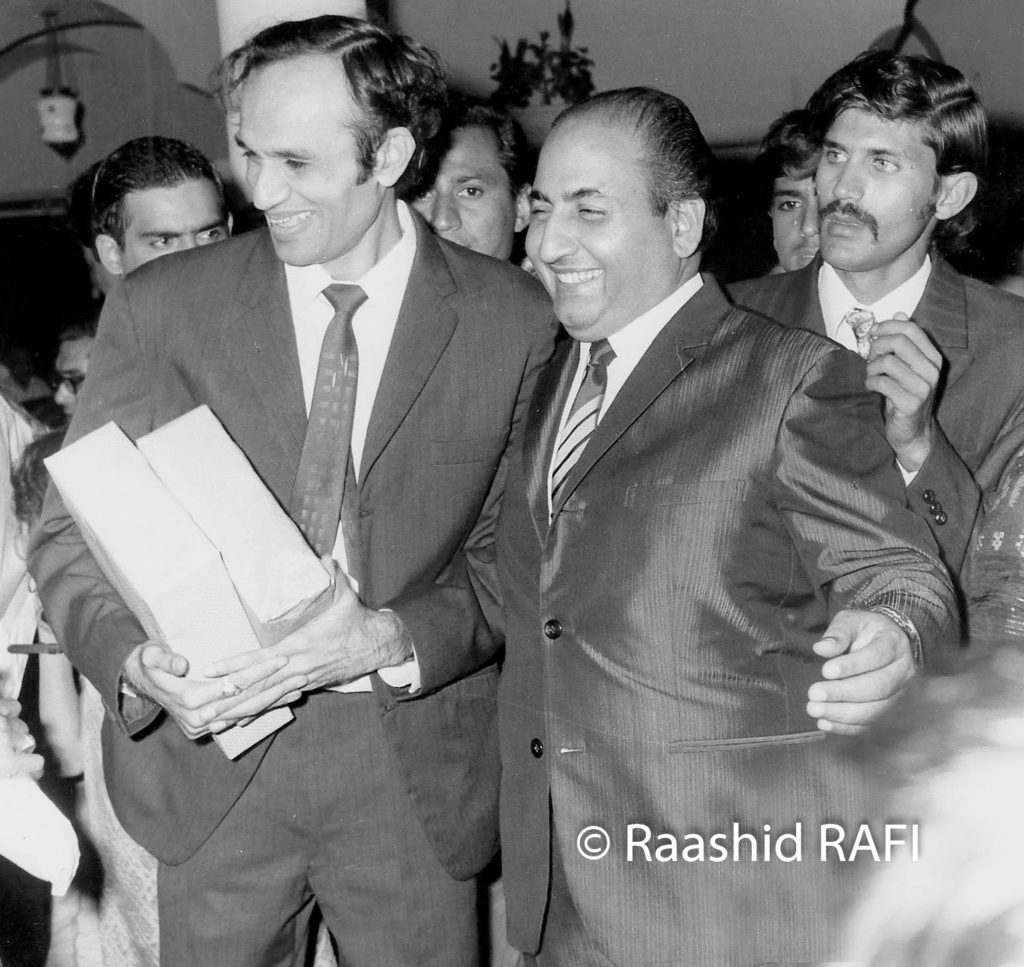
Now this is a very interesting and pleasant coincidence.
December is the month when I celebrate two birthdays – my own and that of my biggest idol – Mohd Rafi Sahab. There is a difference of exactly two weeks between our birthdays, I was born on the 10th, but I am in a celebratory mood right from the 1st of the month!
The other day I happened to try and list out Rafi Sahab’s songs alphabetically by picking up Only 1 song beginning with each of the alphabets. What turned out as a result of this exercise was something truly profound- Rafi Sahab ’s songs encompassed every emotion, every mood and every kind of expression a singer could display.
I couldn’t help listing the songs, and here is the result. Kindly do not try and rate the songs in order of popularity or any other benchmark. Because each song is truly a gem.
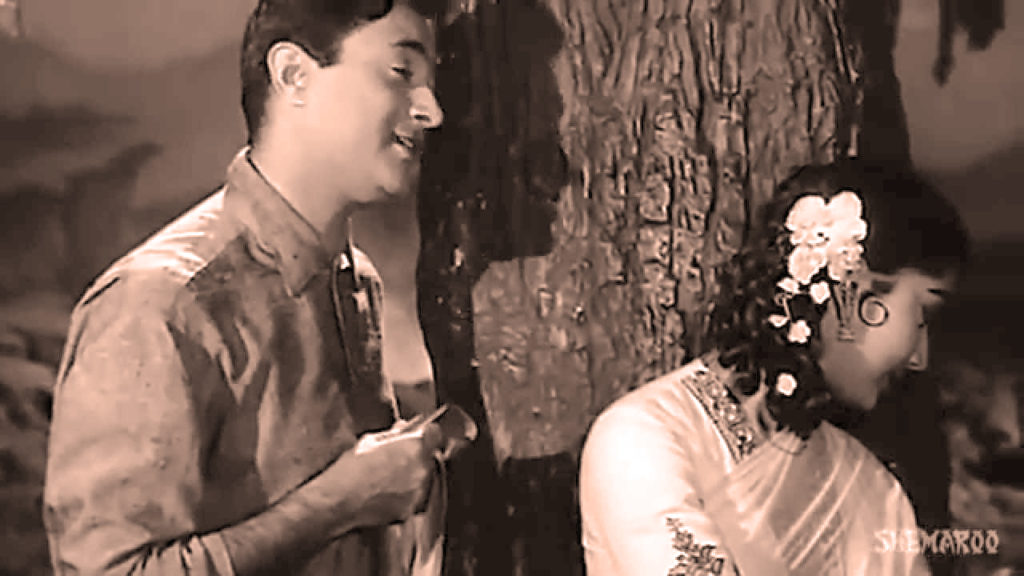
Abhi Na Jaao Chhod Kar– from Hum Dono– if there is a romantic song ever created better than this, I would like to hear it NOW. The teasing, taunting, coaxing, cajoling, the entreaties, the simplicity in the background music by Jaidev, all combine to make this song, even 48 years after its composition, a true landmark song. Not me alone, there are innumerable fans who will say that this song features in their top ten or top twenty. Dev Anand definitely calls it one of the most romantic songs ever created.
Babul ki Duvaaen Leti Jaa– from Neelkamal– No marriage is complete if the band doesn’t play this song (generally in the wee hours of the morning) when the newly wed bride is being seen off by her parents. No other song has generated such emotions, either from a listener, or the singer, or the actor himself, when we think of this grief-stricken number rendered by Rafi Sahab. His son Shahid has recounted how his father broke down during the recording of this song because he had just seen off his daughter a day or two prior to the recording.
Chun Chun Karti Aayi Chidiya– from Ab Dilli Door Nahin– a delightful song for kids. Remember, Rafi Sahab was very fond of kids. He himself had many, and he has sung some beautiful numbers for them. I just love this song and grew up listening to it very often. No child would sit quietly listening to it. The song inspires everyone to get up and dance like little children. An absolutely heart-warming song.quietly listening to it. The song inspires everyone to get up and dance like little children. An absolutely heart-warming song.
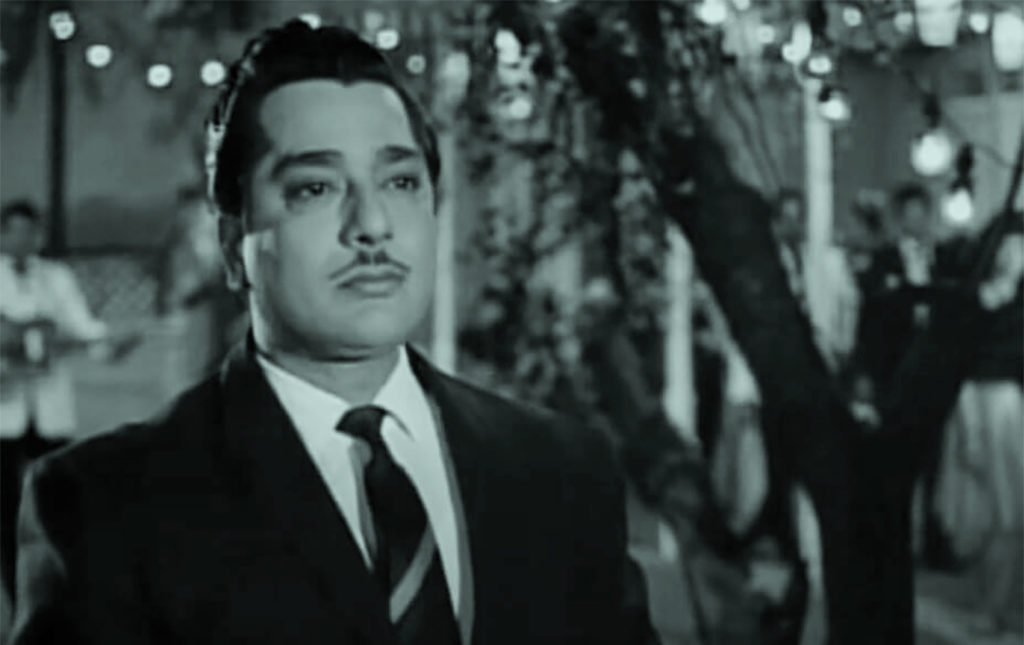
Dil Jo Na Keh Saka Wohi Raaz e Dil– from Bheegi Raat– the jilted lover’s taunts come through so effectively and piercingly as Rafi Sahab sings “aaj dil ki keemat jaam se bhi kam hai”. And it goes to Roshan made the song thoroughly enjoyable with the echo effect at the end of antara, as the great singer’s voice climbs to greater heights to bring out the hurt, the dejection and total agony the hero feels at the loss of his beloved to another person.
Ek Jaanib Sham e Mehfil- from Abhilasha– friends of mine know that I just love this song no end. I must listen to it everyday. A rare male duet in the sense that Rafi Sahab and Manna Da turn out a truly peppy, zestful and playful number accentuated by the use of the piano, one of R D Burman’s very early compositions. Never mind that the film bombed. Never mind that the hero and the second hero never really made it big. The song just keeps its tempo right through and the two singers match each other brilliantly for effect.
Falsafa Pyaar ka Tum Kya Jaano– from Duniya– Dev Saab again, in a different mood. A song in praise of love, another lovely piano- based number. But here, the singer touches many notes and doesn’t lose control on a semi-classical compositon that has western tones. One of Shankar-Jaikishen’s truly hummable offerings.
Gham Uthaane Ke Liye Main toh Jiye Jaaoonga_ from Mere Huzoor– a total contrast from the previous song. A totally dejected and repentant Jeetendra sings this song that Rafi Sahab has put his heart truly into. “Tera mujrim hoon musibat ke siwa kucchh na diya” just about explains so beautifully the anguish and regret in the singer’s feelings. A beautiful S-J number.
Hum Bekhudi Mein Tum ko Pukaare Chaley Gaye– from Kala Paani– Dev Saab, Rafi Sahab and total intoxication. A sad Ghazal, portrayed beautifully to the tune of a dancing Nalini Jaywant and a very nostalgic and melancholic hero. Majrooh scores with great lyrics like “sheeshe mein aapko bhi utaarey chale gaye” but one cannot take away the total involvement of the singer in making this song such a big hit.
Ik But Banaaongaa Tera Aur Pooja Karoonga– from Asli Naqli– truly romantic number. A school teacher being wooed with rain in the background and a naughty attempt to gain the lady’s attention. Hasrat Jaipuri has always been known for his heart-warming lyrics. Rafi Sahab adds his weight to the pleasant song with just the right touch of peppiness and vigour. The song remains one of the freshest songs even today.
Jahan Daal Daal Par Sone ki Chidhiyaan karti Hai Baseraa– from Sikandar E Azm– Total patriotism, as Rafi Sahab makes one’s chest swell with patriotic fervour. This song is sung even today at various functions and every time Indians get together to celebrate national festivals. My personal favourite, and way way better than those Purab aur Paschim songs.
Kya se Kya Ho Gaya Bewafa Tere Pyaar Mein- from Guide-Shailendra wrote some mesmerizing lyrics and Burman Da gave magical music, but it is Rafi Sahab ’s powerful voice that takes this song to great heights. This song symbolizes wistfulness and a feeling of abject surrender and loss and helplessness. A truly terrific song.
Leke Pehla Pehla Pyaar– from CID– a wonderful song in the “teasing” mode. The street singers gently and lovingly tease the lovelorn lady as she goes around looking for her man. The mood is absolutely light hearted and pleasant and Asha Bhonsle renders tremendous support to Rafi Sahab in making this song really memorable. Simple tune, the evergreen harmonium, O P Nayyar’s magical touch make the song one of my all time favourites.
Main Zindagi ka Saath Nibhaata Chala Gaya– from Hum Dono– my “signature song”. The philosophy of life. Forget the past, live in the present, enjoy each day, and make light of anything. Just a cigarette lighter, simple hummable tune, and what a rendering by Rafi Sahab. My caller tune for so many years that I can’t even remember. Anybody who listens to this song is going to say- har fikr ko dhuven mein uda………………..!!!!
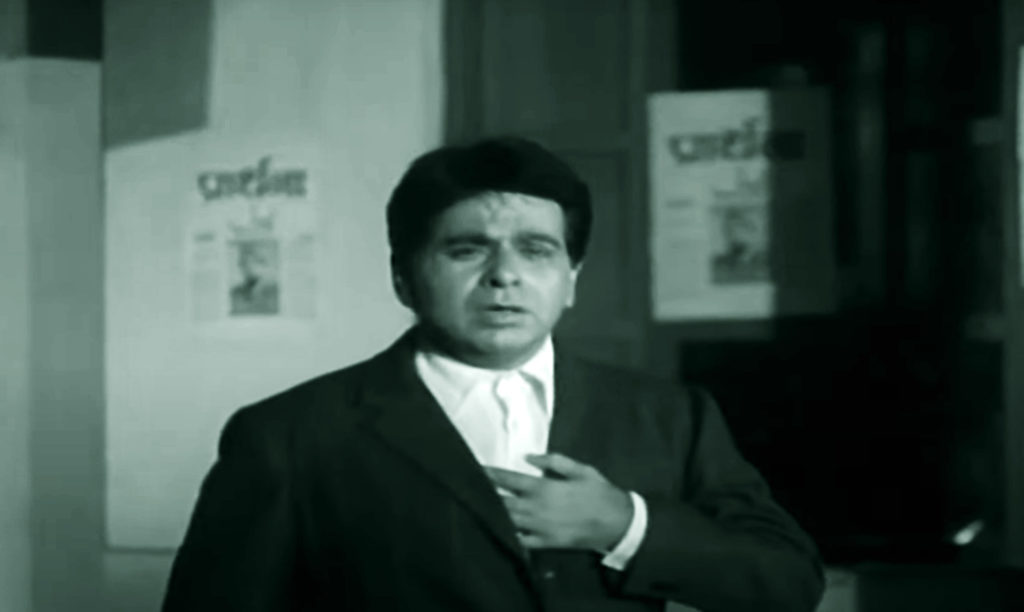
Na Tu Zameen Ke Liye- from Dastaan– a Dilip Kumar movie where the singer expresses total dejection and loss. Defeated, cheated and thoroughly out of sync with the world, “garaz parast jahaan mein wafaa talaash na kar” brings out the loss of faith in the world and a feeling of deprivation that only Rafi Sahab could express so beautifully and with dignity. One of the last few songs that one would associate for the Rafi- Dilip combo, which produced many great numbers.
O Duniya ke Rakhwaale– from Baiju Bawra– Who doesn’t know this song? If anybody doesn’t know this song, he doesn’t know Mohd Rafi. And if anybody doesn’t know Mohd Rafi he doesn’t know music. And if anybody doesn’t know music he should just listen to this absolutely stunning song of Rafi Sahab’s. In the movie, Baiju Bawra makes the idol weep in response to his song. I have no doubts that the Gods would have wept at the soulful rendering that continues to touch everybody’s heart even today.
Pyaar ki Raah Dikha Duniya Ko-from Lambe Haath– A sensitive yet stimulating patriotic song specially sung for kids by Rafi Sahab. When he says ”tum mein hi koi Gautam hoga, tum mein hi koi hoga Gandhi”, he inspires every child. The song explores high and low notes and has a children’s chorus which matches Rafi Sahab beautifully to create just that right note of love for one’s country and the desire to excel in own’s work.
Qayamat Qayamat Hai, Yeh Kaisi Gham ki Shaam Hai-from Mr Natwarlal– Many people wrote off Rafi Sahab in the 70s, saying his singing had declined. This song amply puts paid to such thoughts. In fact this film was made in the late 70s /arly 80s. It may well have been one of his last twenty five songs. This sorrowful community song offering prayers to God and asking for protection from evil and the misdeeds of a few,has been sung beautifully. Rafi Sahab had another lovely number in the same film, where after the villagers get together to teach the villains a lesson, they celebrate by singing “Oonchi Oonchi baton se kisika pet bharta nahi, Ram ka bharosa jisey kabhi bhookha marta nahin”.
Radhike Tune Bansuri Churaayi-from Beti Bete– Rafi Sahab continues to demolish the theory put forward by detractors that he was basically a Qawaali singer. A beautiful classical number with devotion oozing out of every word sung, it has remained for years a favourite of many fans of Rafi Sahab. There are many songs of Krishna that the great singer has rendered but this one is definitely a notch above all the others. If Surdas had been alive today he too would have got up and applauded the great effort.
Saaz Ho Tum Awaaz Hoon Main– from Saaz aur Awaaz– Naushad Saab got just that bit more out of Rafi Sahab than all others, say many music lovers. If that is so, this is a fine example of a classical number to accompany a dancer’s movements. The song explores many Raagas (Patdeep and Madhubanti for sure), many moods, and climbs to various levels in the notes, but Rafi Saab leaves one with a great feeling of satisfaction after listening to this one. Khumar Barabankwi wrote it beautifully, Naushad Sahab gave it new flavours, but Rafi Sahab topped it up with his zest, devotion and involvement.
Tere Mere Sapne Ab Ek Rang Hain-from Guide-Which lady love wouldn’t want to be assured thus? Who would not want someone to sing like this with just the right emotions and words combining to make one feel that there is nothing else in the world but YOU. It is not just because I am a Dev Anand fan, the song on its own stands the test of the time when it comes to being adjudged one of the most evergreen romantic solos in Hindi Films. It is now 45 years and even today the song continues to tug at heart strings, like always. An award winning song in any era.
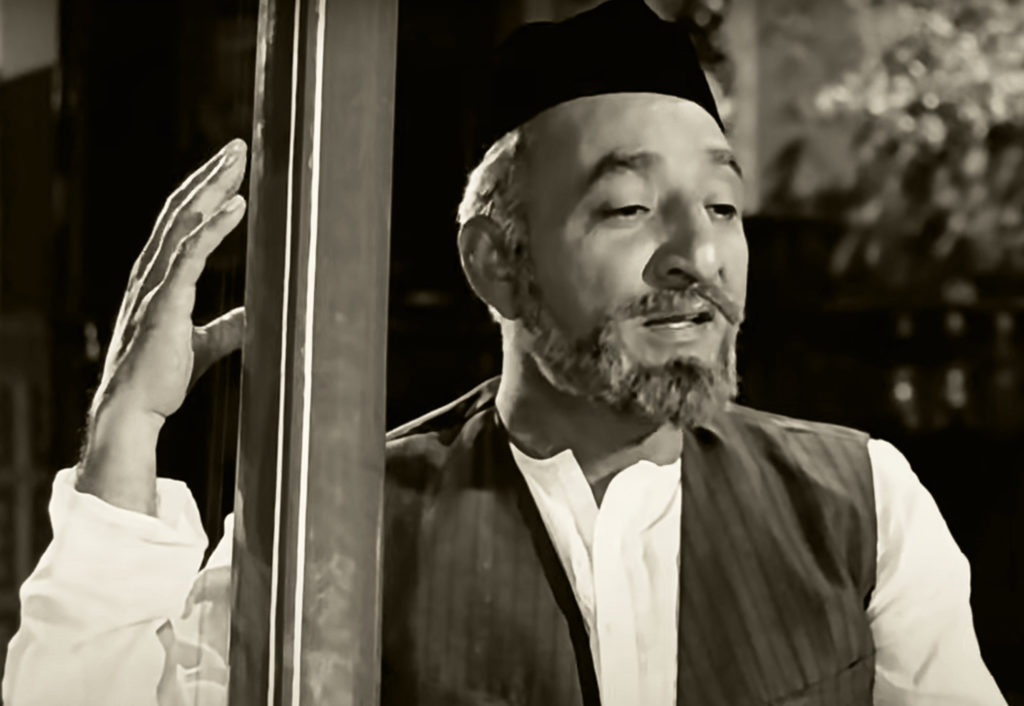
Unke Khayal Aaye Toh Aate Chale Gaye-from Lal Patthar– a Ghazal par excellence. Rafi Sahab’s own idol G M Durrani sat singing this song in the film, and what better tribute could one give to his senior than by singing such a delicately beautiful number. Rafi Sahab was not all Yahoo or boisterousness personified. The film had many songs, each vying for attention against the other, but I choose this one right at the top. Even way ahead of Re Man Sur Mein Ga by Manna da and Asha Bhonsle.
Vada Kar Le Saajna-from Haath ki Safaai– Many people will wonder why I picked this song. The reason quite simply is- yes, quite simply, a simple love song. A duet. After many years one heard a Lata-Rafi duet that was so simple that it brought back memories of Ek Tera Saath Humko do jahaaan se pyaara hai, or Tum hi tum ho mere jeevan mein. Remember, this song is from the 70s, and Rafi Sahab was sadly getting fewer numbers to sing. This duet stands out as a calming reassuring and an oh -so -absolutely-in-love rendition.
Woh Hum Na They Woh Tum Na They-from Cha Cha Cha-Unsung, treated as low priority, and perhaps not so popular, this song tugs at the heart strings. It makes you feel the agony and the sorrow combined with nostalgia that the great singer expresses here. A forgettable film, a low ranking hero, an unusual heroine, a lesser known music director, but Gopaldas Neeraj got Rafi Sahab to mouth one of the most touching songs ever composed. Iqbal Quereshi kept the tune simple and Rafi Sahab scored. Please do listen to this song and tell me why it should not be rated as one of his top 25 sad songs. Who else could justice to such lines as”luti jahaan pe bewajah, paalki bahaar ki”?
X – I know Rafi Sahab had no song beginning with this so very English alphabet. But I can only think of one word to describe every song of his. Excellent.
Yaad Na Jaaye Beete Dinon Ki– from Dil Ek Mandir– a song that must have got the other tragedy king, Rajendra Kumar get kudos for yet another performance. Without the voice that sang this super nostalgic piece, who would recognize the actor? “kehne ko hain who paraaye”, these lines make one shudder with abject dejection and loss, but also feel thankful that there was one singer who could evocatively bring out just those right emotions and so perfectly too. This song is one which I say “seene se rehta lagaaye”.
Zindabaad Zindabaad Ae Mohabbat Zindabaad– from Mughal E Azm– this is not just a song. It is a powerful wave of emotions, a rebellion against the enemies of love, a staunch protest against hatred, and a revolution in its own way. A ballad or an ode to love, sung by a mad man. And the mad, open and absolutely zealous protest against an emperor with a heart of stone is bound to make anyone weep and take notice of the young lovers who are so besotted with each other. The chorus, the lovely use of the classical ragas in each antara, and Rafi Sahab’s total devotion to this song makes it unforgettable. The courageous voice says “Seena Taane Maut se khele, kucchh na karey fariyaad”.
Now we all know why Rafi Sahab was known as the singer for all occasions, for all moods and for all times.
Long live Rafi Sahab. A Very Happy Birthday to my Idol. He shall live forever in our hearts.

The article is a wonderful tribute to the legendary singer Mohammed Rafi. The article explores the remarkable vocal range and versatility of Rafi Sahab, who is considered one of the greatest singers in Indian cinema.
The article dives deep into Rafi Sahab’s career and how he rose to become a prominent figure in the music industry. It discusses how his exceptional ability to sing in various genres, from classical to pop, set him apart from his peers. The article also delves into his collaborations with the greatest composers of his time, such as Naushad, Shankar-Jaikishan, and O.P. Nayyar, and how they brought out the best in each other.
One of the highlights of the article is how it showcases the diverse range of songs that Rafi Sahab sang throughout his career. From romantic ballads to patriotic anthems, Rafi Sahab proved his versatility time and again, delivering each song with perfection and emotion.
The article also touches on the social and cultural impact of Rafi Sahab’s music, and how it resonated with people from all walks of life. His songs continue to inspire and touch hearts even today, decades after their release.
Overall, the article is a fitting tribute to the incredible talent and legacy of Mohammed Rafi. It showcases his versatility, range, and emotional depth, and how he truly was a master of the complete range. Fans of Rafi Sahab and Indian cinema music enthusiasts alike will enjoy reading this insightful and informative article.
The article by Achal Ji is a beautiful tribute to the legendary Indian playback singer, Mohammed Rafi. Achal Ji explores Rafi’s vast range and versatility as a singer, spanning multiple genres such as romantic ballads, classical songs, and patriotic anthems. The article goes into great detail about Rafi’s unique voice and his ability to modulate it flawlessly to convey the right emotion in every song.
The article is written with a great deal of passion and admiration for Rafi’s artistry, and Achal Ji provides some interesting insights into his life and career. The anecdotes shared in the article paint a vivid picture of the man behind the music and add a personal touch to the tribute.
Overall, Achal Ji’s article is a wonderful tribute to Mohammed Rafi’s immense talent and enduring legacy. It is evident that Achal Ji has a deep appreciation for Rafi’s music and has been moved by his artistry. The article is well-written, engaging, and serves as a fitting homage to one of the greatest singers in the history of Indian cinema.
This is a fitting tribute to one of the greatest playback singers of Indian cinema. Mr. Rangaswamy’s writing style is engaging and informative, providing a detailed insight into Rafi Sahab’s life and music. I particularly liked how the article discussed the technical aspects of Rafi’s singing, such as his voice range and modulation, which helped me appreciate his talent even more. Thank you.
As a lifelong fan of Mohammed Rafi, I thoroughly enjoyed reading. It provides a comprehensive overview of Rafi Sahab’s contribution to the Indian music industry and how he became one of the most versatile singers of his time. I also appreciate how Achal ji has highlighted Rafi’s collaborations with various music directors and composers, giving readers an insight into the behind-the-scenes workings of the industry. Highly recommended.
This is great introduction to Mohammed Rafi’s music for anyone who may not be familiar with his work. An excellent job of providing context and explaining the technical aspects of Rafi’s singing, making it accessible to a wide audience. Thank you for citing the legend’s songs.
Thank you. This is a wonderful tribute to one of the greatest singers of Indian cinema. Your love and appreciation for Rafi Sahab’s music is evident throughout the article, making it a heartfelt read. I particularly liked how the author discussed the various genres that Rafi sang, showcasing his versatility.
I found this article on Mohammed Rafi to be a fascinating read. The author’s passion for Rafi Sahab’s music shines through in their writing, making it a joy to read. I particularly enjoyed learning about the history of the Indian music industry and how Mohammed Rafi played a pivotal role in its development. The article is well-researched, and the author’s insights into Rafi’s music are spot-on. A must-read for any fan of Indian music.